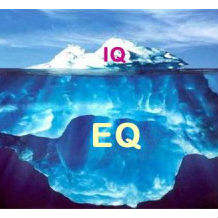According to a number of authorities, raising one’s emotional intelligence takes time and a personal commitment to growth in order to see positive changes. How often has one experienced or heard of a boss that drives away talent or perpetuates an exodus of mass employees before any action is taken? There are ways to identify the emotional intelligence of candidates during an interview and avoid the painstaking process of losing your A players and replacing the burdensome employee.
 Cognitive intelligence alone will not create an all-star, but the combination of cognitive and emotional intelligence will. Dr. Reuven Bar-On, a renowned expert and pioneer of emotional intelligence, developed a model that encompasses self-perception, self-expression, interpersonal, decision-making, and stress management. He defined emotional intelligence as “an array of non-cognitive capabilities, competencies, and skills that influence one’s ability to succeed in coping with environmental demands and pressures.” This has been further refined to a newer model as “a set of emotional and social skills that collectively establish how well we perceive and express ourselves, develop and maintain social relationships, cope with challenges, and use emotional information in an effective and meaningful way.
Cognitive intelligence alone will not create an all-star, but the combination of cognitive and emotional intelligence will. Dr. Reuven Bar-On, a renowned expert and pioneer of emotional intelligence, developed a model that encompasses self-perception, self-expression, interpersonal, decision-making, and stress management. He defined emotional intelligence as “an array of non-cognitive capabilities, competencies, and skills that influence one’s ability to succeed in coping with environmental demands and pressures.” This has been further refined to a newer model as “a set of emotional and social skills that collectively establish how well we perceive and express ourselves, develop and maintain social relationships, cope with challenges, and use emotional information in an effective and meaningful way.
Typically, a set of purposeful interview questions will focus on accomplishments, challenges, and results achieved to get a vision of one’s performance. For example, what did you do; why were you chosen; how did you do it; why did it have to be done; how did you influence others; and what were the overall benefits for the company to name a few? The observations and responses to look for in a healthy emotional IQ that embraces the model would include the following:
- Within self-perception, there exists the observation of how individuals value and regard themselves. Is it inflated, confident, convey job satisfaction, and does it align with external perceptions?
- Emotional awareness is perhaps the most critical indicator of evolvement. It may appear as a presence and the ability to not only experience one’s emotions but also observe them at the same time. Therefore, one possesses clarity about how they are being and projects their emotions and perceptions onto another. To what extent does one take ownership of emotions whether conscious or unconscious such as fear, limitations, or anger?
- Self-actualization is a good indicator of performance, reflecting the desire to become more of who they are. There is an ability to manifest their desires and objectives into fulfillment while maintaining balance within their life.
- Self-expression is not limited to the ability to effectively communicate but encompasses energy as well. Look for the underlying beliefs, enthusiasm, and passion for one’s work. Determine whether there exist the happiness and well-being factors of enjoying one’s self and others.
- Interpersonal relationship skills are a key portal for determining how well one will resonate and be able to influence others. It combines the ability to calmly and at times assertively engage and respond to others without going into a reactive mode that may be perceived as a heavyweight or volatile personality. Does one demonstrate empathy and social responsibility in their activities?
- The quality of one’s decision-making is a key driver to strategy, action, and ultimately achieving goals. How is this being done? Assessing the details of how one goes about problem-solving as well as identifying and testing the facts and noting what emotions surface at the point of a final decision are essential. Are they impulse-driven or process-driven with a sense of peace in the making?
- How one manages and tolerates stress during times of crisis or change will depend on whether there is an ability to cope and how. Does an individual choose to take actions that limit stress and feelings of hopelessness; the actions taken reflect optimism and conviction in overcoming the challenges; is there confidence to influence others for a positive outcome?
Emotional intelligence is a continuum that evolves and often the best opportunities for growth are in the experiences that give us discomfort. If we allow the awareness to surface, we may discover insights about ourselves as well as the next step in taking action that serves our souls and others.
Karen Sadowski, President
KMS Associates, Inc.



Leave a Reply